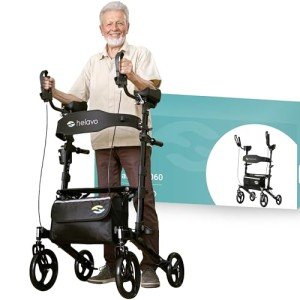
17
SeptemberYou'll Never Guess This Lightweight Walker's Benefits
The Essential Guide to Lightweight Walkers: A Comprehensive Overview
As life goes on, mobility can frequently become limited for numerous reasons, such as age, injury, or health conditions. For lots of people, having the best mobility aid is important for maintaining self-reliance and self-confidence while moving about. One of the most popular choices available on the market today is the lightweight walker. In this post, we will dive deep into the world of lightweight walkers, exploring their features, advantages, and factors to consider for selecting the right one.
What is a Lightweight Walker?
A lightweight Easy-To-Use Walker is a kind of mobility aid created to support people who require assistance with walking but need a solution that does not concern them with excessive weight. These walkers are generally made from durable yet lightweight materials such as aluminum, making them easy to lift and maneuver. They can significantly improve mobility and promote a sense of independence for users.
Features of Lightweight Walkers
Choosing the ideal lightweight walker involves comprehending the different features they use. The following table outlines some common features and specs to search for when picking the perfect walker:
| Feature | Description |
|---|---|
| Product | Typically made from aluminum or other lightweight materials for easy mobility. |
| Weight Capacity | Normally supports between 250-350 pounds, but this varies by model. |
| Foldable Design | Lots of lightweight walkers featured a foldable feature for easy transport and storage. |
| Height Adjustability | Users can customize the height to make sure comfort and proper posture. |
| Hand Grips | Ergonomic handgrips provide added convenience and safety while walking. |
| Wheels | Some designs include rubberized wheels for smoother mobility, while others are developed without them for a sturdier base. |
| Devices | Choices for baskets, trays, or other add-ons to enhance performance. |
Advantages of Using a Lightweight Walker
Lightweight walkers offer numerous benefits, making them an ideal choice for those requiring mobility assistance. Here are some substantial advantages:
Enhanced Mobility: Lightweight walkers allow users to navigate through spaces with ease, promoting independence.
Easy to Carry: Their lightweight design allows users to lift and transport them without difficulty.

Stability and Support: Walkers provide a stable base for users, making walking much safer and minimizing the danger of falls.
Enhanced Posture: The adjustable height feature assists users preserve appropriate posture while walking, adding to long-term health.
Adjustable Features: Many designs offer a series of accessories that can be customized to fit individual needs.
Affordability: Compared to other mobility help, lightweight walkers are typically more budget-friendly without compromising quality.
Considerations When Choosing a Lightweight Walker
Choosing the ideal Lightweight 4-Wheel Walker walker includes considering numerous aspects that line up with private requirements. The following list provides key aspects to analyze:
User's Weight and Height: Ensure the walker can accommodate the user's weight and can be changed for height.
Surface: Consider where the walker will mostly be utilized (indoor, outdoor, smooth surfaces, unequal terrain).
Functional Needs: Think about any particular requirements such as walking speed, frequency of usage, and preferred features (like baskets or detachable seats).
Mobility: Determine whether the walker requires to be quickly transportable for getaways or journeys.
Type of Walker: Decide between standard, wheeled, or rollator walkers based on the user's balance and walking capability.
Regularly Asked Questions (FAQ)
1. Who should use a lightweight walker?
Lightweight walkers are ideal for elderly individuals, those recovering from injury, or anyone who requires extra support while walking.
2. How much do lightweight walkers typically cost?
Pricing can differ based on features and brand. Lightweight walkers can range from ₤ 50 to ₤ 250, with more Advanced Mobility Aid designs costing more.
3. Are there walkers particularly designed for outdoor use?
Yes! Some lightweight walkers featured larger wheels and more durable building, making them ideal for outdoor surface.
4. How do I know which height is appropriate for the walker?
When utilizing a Innovative Walker Design, the user needs to adjust the handgrips to elbow level when their arms are unwinded at their sides, preserving a slight bend in the elbows.
5. How often should you check a lightweight walker?
It's great practice to examine the walker for wear and tear regularly. Search for any loose parts, used grips, or damaged wheels, specifically if utilized daily.
In summary, a lightweight Comfortable Walker functions as an important tool for people in need of mobility assistance. Its mix of ease-of-use, security, and personalization permits users to confidently engage with their environments while maintaining independence and personal mobility. When selecting the right walker, it's important to think about the user's individual needs, chosen features, and designated use.
With numerous designs offered in today's market, potential users can discover the best lightweight walker that will not only enhance their mobility but likewise improve their general quality of life. After all, everybody deserves the liberty to move with self-confidence and ease.


Reviews